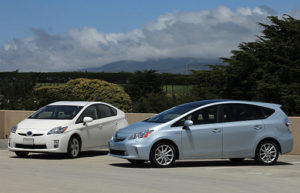Is the proposed hybrid/electric vehicle tax a good idea?

In February, Maine’s Governor LePage proposed implementing a fee on the owners of electric and hybrid vehicles.[1] He is not alone – 17 other states have already implemented similar fees[2]). It may seem, at first glance, to be yet another slap in the faces of “liberal-minded environmentalists.” But giving the Governor the benefit of the doubt, it’s actually attempting to solve a problem that’s been seemingly intractable for years: that the state highway trust fund is overextended, at a time when the state’s infrastructure is badly in need of investment.
Maine, of course, is not alone. The Federal Highway Trust fund, which is primarily funded by federal taxes on gasoline, is also underfunded and over-extended. Much like other issues in Congress, though, potential solutions seem to be few and far between, and no politician wants to propose anything as unpalatable as a tax increase.
So, what’s the problem? The highway funds at both the federal and the state level are funded primarily through taxes on gasoline. In Maine, slightly less than 70% of revenues earmarked for the State Highway Fund are from gasoline taxes. Another 27% come from vehicle registrations and fees, leaving the remaining 3% to come from various other sources[3]. In 1991, the first year for which revenue for the highway fund is reported on the legislature’s web site[4] , the highway fund received approximately $197 million (or approximately $363 million in today’s dollars). In 2015, the fund received approximately $308.5 million (or $327 million in today’s dollars). That’s a decrease of about 10% in real terms, despite the fact that the Association of Civil Engineers has given Maine a D on roads, essentially unchanged since 2008.[5]
Moreover, whereas the federal government has supplemented its declining revenues with other sources (with questionable legality), Maine cannot do the same. So how did we get in this mess?
The answer is that the tax is poorly targeted and creates perverse incentives. Let’s start with the targeting question. Taxes are supposed to do several things, from an economic viewpoint: raise revenue and change behavior. In this case, the tax is primarily to raise revenue for the highway system. Some environmentalists would also like to see the gasoline tax used to reduce the demand for and usage of gasoline, as one of the culprits in climate change, but the two objectives are fundamentally at odds, for several reasons.
First, if the revenue from a tax is used to fund a particular program, then the tax should be designed to bring in a sustainable amount of revenue year after year. In this case, the revenue from the gasoline tax has been declining year after year. This decline is due to both technological advances and changes in demand. Average fuel economy for passenger cars has been generally rising since 2000, and the trend has been similar for trucks since about 2004. Average fuel economy for both cars now stands at about double what it was in the 1970s, meaning today’s cars can travel twice the mileage on a tank of gas than they could back in the 70s[6]. That’s great news for the environment, but not great news for those who depend upon the revenue from the gas tax.
Second, even as the Maine population increases, the number of miles driven has not increased. In fact, whereas you normally might expect to see people driving more miles as it becomes cheaper to do so, we aren’t seeing such a trend. In fact, while Mainers drove about 14,925 in 2005, that number actually dropped to 14,838 in 2016[7]. So, the revenue from the gas tax has been hit doubly hard: the average miles per gallon has increased, while the number of miles driven per year has decreased. We could of course increase the gasoline tax (it hasn’t been increased since 2011), but that is likely to further dampen the demand for purchases of gasoline.
So, what to do? We could, of course, follow Governor LePage’s recommendation and impose a surcharge on hybrid and electric vehicles. In one way, that would address the “free rider” problem that some analysts have pointed out: that owners of hybrid and other fuel-efficient vehicles use the highways as much as others, but don’t pay their “fair share” to the highway fund.[8]
Ultimately, though, that would not solve the problem, because the gas tax is poorly targeted in the first place. The wear and tear on our infrastructure is tied to the usage of the highway, which is only imperfectly proxied by gallons of gasoline purchased. A better targeted tax would be to impose a tax on vehicle miles driven, like the one currently being studied by the Colorado Department of Transportation. [9] Of course, such a system would require some method of tracking number of miles driven, either through electronic monitoring such as those already in place on tolled highways, or through some other system.
Such a tax would not, of course, create an incentive for individuals to buy more fuel-efficient vehicles, which is one of the reasons why environmentalists like the gas tax. The gas tax, in their mind, is akin to a cigarette tax, which aims to curb smoking by increasing the price. But if the goal there is to reduce carbon emissions, a tax on the carbon content of fuel, not the gasoline itself, would be a more efficiently targeted tax. But that’s a different blog post, for a different day. (You may view my blog posts on the carbon tax, here and here.)
[1] https://www.epa.gov/fuel-economy-trends/highlights-co2-and-fuel-economy-trends
[2] https://www.fhwa.dot.gov/policyinformation/statistics/2013/hm60.cfm
[3] http://www.thedrive.com/tech/18549/maine-and-colorado-struggle-to-tax-electric-cars-fairly)
[4] https://www.pressherald.com/2018/02/08/legislation-calls-for-new-annual-fee-on-all-electric-hybrid-cars-in-maine/
[5] https://www.greentechmedia.com/articles/read/13-states-now-charge-fees-for-electric-vehicles#gs.y_6lSMM
[6] http://legislature.maine.gov/legis/ofpr/highway_fund/pie_charts/Hfpie1213.pdf
[7] http://legislature.maine.gov/legis/ofpr/highway_fund/rev_exp_history/index.htm
[8] https://www.infrastructurereportcard.org/wp-content/uploads/2016/10/Maine-Report_Card_final_booklet.pdf
[9] https://www.denverpost.com/2017/12/12/colorado-mileage-tax-experiment/